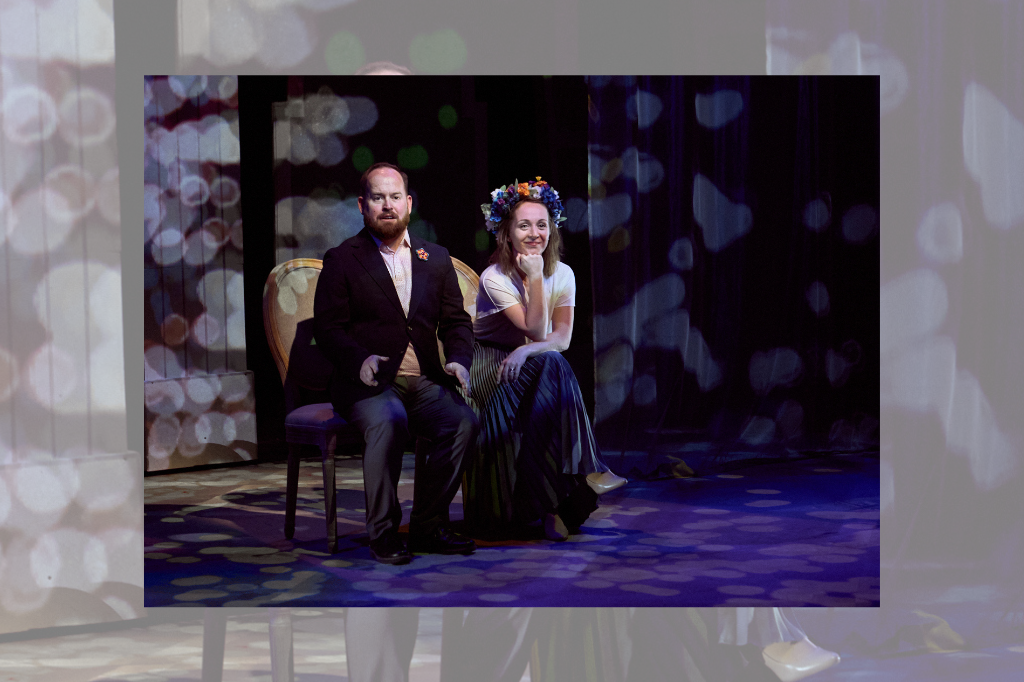REVIEW: First Métis Man of Odesa at Punctuate! Theatre/Theatre Centre
“I don’t need your donations, I need an apartment,” says Ukrainian actress Mariya Khomutova, playing herself, right after the audience for First Métis Man of Odesa is encouraged to donate to support those who are most impacted by the war in Ukraine. These words are a wake-up call for the audience to pay attention and listen.
The second wake-up call is the sound of a missile hitting.
This is how First Métis Man of Odesa, directed by Lianna Makuch, grabs the audience’s attention and keeps them on the edge of their seats during the 90-minute performance. Balancing on the edge of art and reality, Canadian playwright Matthew MacKenzie and the Ukrainian artist Mariya Khomutova — the writers and the actors of the play — bring to the stage the story of their love, mixed with the bitterness of the COVID pandemic, the pain of the full-scale Russian invasion of Ukraine, and the obstacles of long-distance relationships.
The difficulties of those struggles are familiar to me. I am also Ukrainian and moved to Toronto, unable to see my family during COVID, terrified of what might happen during the war.
Punctuate! Theatre in association with Theatre Centre invites us into their tight-knit space where the border between the audience and the actors is blurred, and it feels like you’re in Matthew’s and Mariya’s kitchen, listening to them answer to the question, “so, how did you guys meet?”
The story teleports the audience back to 2014, during the first Russian invasion of Ukraine and Ukrainian people’s fights for a better future. Mariya is a successful actress focused on her art, cooking borscht for veterans of the Maidan revolution; she met Matthew when he arrived for a theatre research trip in Kyiv. The playwright jokes that he was intimidated at first by the Odesa-born diva (who tells us she’s three handshakes away from Stanislavski), then he jokes more, leaving the audience in hysterics, at times shaking their seats with laughter. But just when the couple starts warming up to each other, it’s time for them to part.
The couple breaks the fourth wall, letting us into their home and their hearts, not just to acknowledge the audience, but to make sure they are listening and paying attention.
Although there are only two actors on the stage, there are many characters in the story who you vividly see throughout the performance, such as Ukrainian veterans, the lovers’ parents, and their bridesmaids, who all played a special part in the events which brought Masha and Matthew together.
A separate character in the play is the music by Daraba, a creative audiovisual formation based in Kyiv, and the sounds by sound designer Aaron Macri, who conveys that specific feeling of being in the warm, picturesque streets of Odesa and the terror of the missiles flying over people’s heads.
Another metaphorical actor in the show which plays an influential part in the storytelling is the projections on the walls, as well as the decorations integrated into the performance by projection designer Amelia Scott. At times this specific element is exactly what plays on the sensitive strings of the audience’s emotions, which on opening night made many tear up in the darkness. A moment which produces a particularly powerful effect begins with the projection of naked, gloomy woods, while Mariya tells the story of one of her bridesmaids who had to travel within occupied Mariupol.
Although the story itself unfolds in many different places like Toronto, Edmonton, and Kyiv, the decorations onstage remain the same, creating a feeling of theatre inside the theatre through the use of curtains, painted windows, and a column inspired by those you might see in the theatres like the Odesa Opera and Ballet Theatre. However, throughout the story, the ground beneath the characters shakes, and so too do the decorations. The curtains fall, and the column moves to the centre stage as a literal and metaphorical wall between the couple.
The script finds a perfect balance between honesty and humour, where the audience isn’t left in utter despair yet is always reminded of the heartache the main characters of the story (and many others) have experienced. Matthew’s jokes and Mariya’s witty comebacks make the audience relate, as if they’re talking to an old friend with a special kind of sincerity. Another detail that makes the script feel so personal is the many names Matthew uses for his spouse, Masha or Mashenka, and then for their child, Ivan or Vanya. In Ukrainian culture it just sounds too official and serious to call your loved one Mariya all the time — the name changes when you become closer to a person.
The play raises the important question of whether turning real-life events into art is appropriate or not, and whether that can be helpful during life-changing events both for the artists and the viewer. However, by the end of the play when the lights are on, it is clear how much power the art holds. On opening night, the audience wiped the tears off their cheeks with a big smile on their face.
First Métis Man of Odesa captures how the fates of two people are entwined into global events larger than life, and how one cannot exist without the other. The honesty onstage will capture the heart of whoever gets the chance to see the play, and will leave you transformed and with the question lingering in the air — “what should I do next?”.
First Métis Man of Odesa runs at the Theatre Centre March 30 through April 8, 2023.









Comments